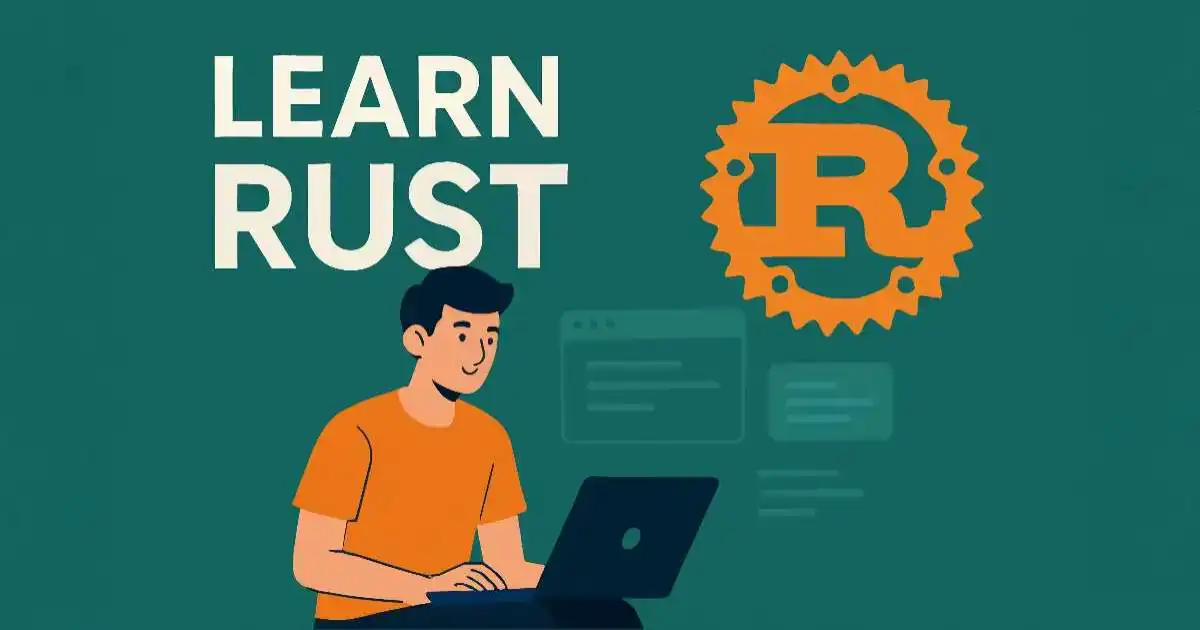How to Learn Rust: A Complete Beginner's Guide in 2025
Rust is one of the most powerful programming languages of modern times. Known for its high speed, memory safety, and performance without garbage collection, Rust has become a favorite among developers building systems, blockchain platforms, and performance-critical applications.
This guide covers everything you need to know to start learning Rust, including what it is, how to use it, where it's used, why it's better than other languages, and a complete learning roadmap.
What is Rust?
Rust is a modern systems programming language developed by Mozilla. It is designed for performance, memory safety, and parallelism. Unlike other languages like C or C++, Rust provides memory safety without a garbage collector.
Key Features of Rust:
- Memory-safe with zero-cost abstractions
- Ownership and borrowing system for memory control
- High-level syntax with low-level control
- Concurrency without data races
- Compile-time safety checks
Where is Rust Used?
Rust is used across multiple industries and technologies, especially where speed and safety matter.
| Area | Usage Description |
|---|---|
| System Programming | Writing operating systems, drivers, and firmware |
| Blockchain Development | Building smart contracts (Solana, NEAR) and full blockchain nodes (Substrate) |
| WebAssembly | High-performance web apps running inside browsers |
| Command Line Tools | Tools like ripgrep, bat, fd are written in Rust |
| Game Development | Game engines and rendering pipelines |
| Edge Computing | Applications running on edge servers or IoT devices |
Why Learn Rust?
Rust is widely adopted for its advantages in both safety and performance:
- High-performance comparable to C/C++
- Prevents memory leaks and segmentation faults
- Helps write safe concurrent code
- No garbage collector, making it ideal for embedded systems
- Excellent compiler with helpful error messages
- Rapidly growing community and ecosystem
How to Learn Rust (Step-by-Step Guide)
Step 1: Install Rust
Official installation link: https://www.rust-lang.org/tools/install
Or install via terminal:
curl --proto '=https' --tlsv1.2 -sSf https://sh.rustup.rs | sh
Install Visual Studio Code and add the rust-analyzer extension for better development experience.
Step 2: Start with Basics
The best place to begin is the official Rust book:
The Rust Programming Language
Link: https://doc.rust-lang.org/book/
Topics to focus on:
- Variables and data types
- Functions and control flow
- Ownership and borrowing
- Structs and enums
- Pattern matching
- Error handling
Step 3: Practice with Rustlings
Practice small exercises via this interactive tool:
cargo install rustlings
rustlings watch
Or try: https://exercism.org/tracks/rust
Step 4: Intermediate Concepts
Once comfortable with the basics, move on to:
- Traits and generics
- Lifetimes
- Modules and packages
- Result and Option types
- Collections like Vec, HashMap
Step 5: Build Real Projects
Apply your knowledge through small Rust projects:
- Build a CLI to-do list
- Create a file reader/writer
- Develop a web scraper
- Create a Discord bot
- Build an API client using Reqwest
Step 6: Explore the Ecosystem
Popular Rust crates to explore:
serdefor JSON serializationtokiofor asynchronous runtimeactix-weboraxumfor web serviceswasm-bindgenandwasm-packfor WebAssembly apps
Rust and WebAssembly
Rust can compile to WebAssembly, allowing high-performance applications to run inside browsers.
Use cases include:
- Image and video processing
- Math and scientific computation
- Game engines
- Desktop apps with Tauri or Yew
Tools:
- wasm-pack
- wasm-bindgen
- Yew
- Leptos
Rust and Blockchain
Rust is widely adopted in blockchain development, especially for smart contracts and protocol layers.
| Platform | Rust Usage |
|---|---|
| Solana | Smart contracts are written entirely in Rust |
| NEAR | Smart contracts in Rust or AssemblyScript |
| Substrate (Polkadot) | Framework written in Rust |
| Cosmos (CosmWasm) | Contracts in Rust compiled to WASM |
Popular Tools Built with Rust
- ripgrep (faster alternative to grep)
- bat (better cat command)
- exa (modern ls command)
- Firefox Quantum (parts in Rust)
- Dropbox backend services
- Amazon Firecracker VM
Example Rust Program
fn main() {
println!("Hello, Rust!");
}
Final Thoughts
Rust is not just a fast language, but a safe one. With zero-cost abstractions, powerful concurrency, and compile-time memory management, Rust is a game-changer in systems programming. If you’re serious about learning a future-proof language, Rust is a solid investment.
Resources
- Official Book: https://doc.rust-lang.org/book/
- Practice: https://exercism.org/tracks/rust
- Exercises: https://rustlings.cool
- Frameworks: https://yew.rs, https://tauri.app
- Blockchain: https://substrate.io




